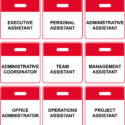
Together we can challenge the perception of our profession says Shelagh Donnelly
Have you ever been stereotyped in your career?
I stay in touch with my readers around the globe through Weekend Polls, raising topical questions each Thursday and publishing results the following Tuesday. This February, when I raised the matter of stereotypes about the admin profession, only three percent of respondents reported that they had not encountered any stereotypes.
It’s worth noting that we’re not alone. Generalisations – accurate or not – are applied to a number of professions. I know a lawyer who doesn’t wait for others to tell their jokes about solicitors; he offers up some of his own. Then there are the accountant jokes, which range from “It’s accrual world” to, “Why are accountants always so calm, composed and methodical? Because they have strong internal controls.”
Whether we frame stereotypes as misperceptions or bad PR, they do exist – and it’s time to dismantle them. In order to do so, we first need to understand peoples’ perceptions.
A career for women and men
Many people think that being an admin. professional is a woman’s career. Male admin. professionals collectively have had a lower profile than their female counterparts for the past 90 years or so, but are making their presence known.
The current landscape stands in marked contrast to the early days of this profession. The term secretary has Latin origins and was used as early as the 1400s to describe a person who maintained records and wrote correspondence, typically for the nobility. Beyond the worlds of politics and castles, the position was referred to as a “Clerk”. Such prestigious positions were typically held by educated men. In fact, this was a man’s world until the 1880s and it wasn’t until after the Industrial Revolution that women made headway in acquiring secretarial roles. Tides shifted with females’ increased access to education, and with perceptions that women’s (in some cases, theoretically) smaller hands were best equipped to operate typewriter keyboards. Run that concept by the millions of men who use smartphones’ significantly smaller keyboards with ease!
By the 1920s, women had for the most part displaced men as secretaries. Today, while women significantly outnumber men in the world of Executive, Management and Personal Assistants (EAs, MAs and PAs), we need to acknowledge and welcome the presence of men in this career.
An educated bunch
Readers responding to my February 2/17 Weekend Poll noted stereotypes that admin. professionals are uneducated and not too bright, or they would have secured “better” jobs. Pretty scathing, yes?
Interestingly, I’ve asked my readers in both 2016 and 2017 about their academic credentials, and the results suggest otherwise. 32% of respondents to my January 19/17 Weekend Poll reported having earned an undergraduate (Bachelor’s) degree, with an additional 9% having earned a graduate (Master’s) degree. In response to the same poll, 18% said they’d earned a post-secondary certificate, while another 12% said they’d earned a post-secondary diploma. In fact, 91% of respondents had pursued formal education beyond the high school level.
How do these figures compare with your education, and those of peers in your workplace and networks? While it’s uncommon in this century for people to secure an EA position without benefit of post-secondary education, that wasn’t necessarily the case in the 1970s and 1980s. With many notable exceptions, I’d suggest that a high percentage of those who entered this career three or four decades ago did so without benefit of completing a post-secondary education. Then there are those, such as one admin. professional I greatly admire, who went on to earn both undergraduate and graduate degrees while working full time and raising two children.
You won’t last without skills
Readers have told me of expectations that the assistant is the person who prepares coffee, and of perceptions that the job consists primarily of typing, filing, maintaining calendars, answering the phone and generally serving as the office “mum”. I don’t doubt that the majority of these tasks fit within many admin. professionals’ portfolios, but there’s much more to the role.
Anyone who is a career admin. professional will tell you that it’s not a job for the unskilled, or the faint of heart. Career admin. professionals who perform at high levels possess hard/technical skills as well as soft/interpersonal skills that require solid emotional intelligence (EQ). They make a point of being well informed about their organisation, their sector, and sociopolitical matters. They invest time in ongoing education and/or professional development, and they’re also invested in the successes of their organisations.
We wield influence
We simply may do so quietly, or without attracting a great deal of notice. Support needn’t imply subservience, but that’s how many perceive the administrative role. One without opportunity for influence. Those with whom we work know better, and so does the International Association of Administrative Professionals (IAAP). The results of the IAAP’s 2013 Benchmarking Survey1 tell us that there are nearly 23 million office and administrative professionals in the US alone – and that approximately 66% of the IAAP’s 2013 survey respondents make and/or recommend purchasing decisions for their employers. That same survey found that the IAAP’s approximately 18,000 professional members alone are responsible for more than $240 million per annum in corporate purchasing.
Of course, influence is not limited to purchasing decisions. Who hasn’t been asked for perspectives on a candidate, a challenge or an opportunity? Beyond that, wise executives value an assistant’s capacity to speak truth to power. No matter how well intended, those in the C-Suite don’t always hear what they need to know. When a strong EA, MA or PA has earned the trust of the person they support, that admin. professional can serve not only as a sounding board for ideas, but also as a respected colleague who will tactfully deliver news or informed opinions that others may hesitate to offer. She or he may also have opportunities to contribute to strategic planning.
A rewarding career
While some perceive assistants to be people without ambition in low paying careers, that’s not necessarily the case. You’ll recall the IAAP’s Benchmarking Survey that I mentioned? That survey found that 23.1% of respondents earned $60k or higher in annual salaries, and a total of 45.3% of respondents earned salaries of $50k or higher per annum.
Dismantling stereotypes: professional associations and networks have a role to play
If you think about the effort required to break old habits and create new ones, it’s little wonder that some people have a difficult time shaking dated or simply unrealistic perspectives on administrative careers.
I’m not alone in advocating for an understanding of who admin. professionals are, and what we do. Victoria Darragh and EPAA, the UK’s Executive & Personal Assistants Association, have also taken a leadership role in challenging assumptions. In particular, EPAA and its Directors have launched a campaign in the UK to raise awareness of men’s presence in the profession. EPAA puts its money where its mouth is; approximately 17% of its Directors are male.
In my Real Careers series, I interview female and male admin. professionals. So far, we’ve explored the realities of administrative careers in 21 different countries, and people are incredibly generous with insights on building and maintaining a successful professional life. Occasionally, I assemble an international panel of Real Careers alumni to tackle specific topics. In my recent series on dismantling stereotypes of the career, I asked what networks and professional associations can do to ensure all their members feel welcome and encouraged to actively participate.
Some of my panelists’ responses reflected a focus on how we brand and present ourselves as a profession. Members encouraged networks to use colour and imagery to effectively signal that this is a career (not just a stepping stone) that is suitable for both women and men. There was also encouragement to do away with “Wonder Women or Supergirl, pink, fluffy marketing material”. In fairness, you’ll see that a number of networks do have gender-neutral colours and branding that present businesslike images; those that don’t are all the more noticeable for that fact. When it comes to Supergirl, those of you who’ve read my July 2016 article “Call Me a Professional, not a Superhero” will already know my view that super heroes and their capes do not position us as professionals.
Most professional networks are led by inspired and inspiring volunteers who are fellow admin. professionals. These individuals deserve a great deal of credit for stepping up to the plate and contributing untold hours of time in addition to their expertise. I encourage such individuals and their networks to consider including this article, and the matter of how we collectively represent the admin. profession, on upcoming agendas.
What impact do you think it might have, for example, if associations and networks around the globe began contacting high/secondary schools and offering representation of the career at career fairs?
The buck stops here
While the media owns a certain level of responsibility for perpetuation of inappropriate stereotypes, we also need to ask ourselves a hard question: have you unintentionally reinforced stereotypes you’d rather dispel?
I suggest that, knowingly or not, many of us – myself included – have done so at some point in our careers. Having acknowledged that, let’s look at how we as individuals can go about reshaping perceptions of admin. professionals.
Busting the stereotypes
There are women and men in this career
This is where professional networks and associations have a particularly important role to play. Ask to include the discussion on an upcoming agenda, and also check your own behaviours. When I first developed interview questionnaires for my Real Careers series, I established a core set of questions and then modified the list: one set for female admin. professionals, and another for the males. I’ve since realised that there was really no reason for this, and have updated the questions so that they’re consistent for everyone I interview.
You’re not anyone’s “girl” or “boy” in the workplace
Think about how you refer to yourself in the office. Not long ago, I spent a great afternoon catching up with some former colleagues. One of the group, a highly skilled EA, recently accepted a promotion she’d quickly come to regret. The frustration? Her new boss routinely failed to demonstrate professional respect for the administrative support staff. When she mentioned that the executive was aggressive and condescending to “all his girls”, I pulled my eyeballs back into their sockets and we spent the next 15 minutes changing the focus from the boss’ inexcusable behaviour to my friend’s choice of words.
I asked this wonderful person if she could imagine a male EA or PA referring to himself as “X’s boy”. No. Or, for that matter, any professional referring to herself or himself as their employer’s “girl” or “boy”? Of course not. When you think or talk about yourself that way in the workplace, you’re giving away power. You’re giving colleagues (not only the executive) permission to view you as subservient. Noting the behaviour of this particular executive, I urged my friend against feeding the beast – or, in this case, his ill-mannered ego.
Own your education, your professional development, and your contributions
Do you include any academic credentials you may have on your business card? On your email signature line? Let your executive and HR colleagues know when you’ve completed a course of professional development. Have you done networking outside the office that’s proven beneficial to the organisation?
If so, you’ve presumably shared the good news with colleagues. Own your accomplishments and contributions. If commended for something you’ve done, be sure that you don’t diminish your efforts.
Practice eliminating phrases such as, ‘Oh, I just … “, “It was nothing ….” and the like from your vocabulary.
Convey confidence
I’m not suggesting anything over the top here; I am simply suggesting that you present yourself as a professional colleague. If you find yourself apologising in the workplace, ask yourself why you’re doing it. Is it because you’ve made a mistake or offended someone, or because you’re hesitant to express your views?
Ensure that your job description is current
Invest some time in reviewing your position or job description. If this is not the right time, take a couple of minutes now to schedule some time in your calendar for such a review. I know that, when I last changed jobs, the position description was dated even before I was hired.
Why is this important? First, you should be compensated for the work you do. Secondly, this represents an opportunity to consider how your responsibilities are represented. The choice of words can have an impact on how people view your contributions. Pay attention to the sections highlighting the required education and skills; compare the terminology with job descriptions for comparable positions advertised by other organisations. You won’t be able to update your job description without the support of your executive or supervisor, so engage her or him in the process.
Remember: your colleagues aren’t your children
You don’t need to be the office mum, so get rid of any candy dish you may have at your desk. Apart from anything else, it’s not good for us! Years ago, when I accepted a new position that saw me supervising several staff, I noticed that my predecessor had a candy dish at her desk. I decided I would keep up the tradition but, a few weeks into the role, questioned the signals it was giving and got rid of it.
Do colleagues come to you for help on the same topic over and over again? Enable and empower them. Direct your colleagues to the resources they need rather than doing the work for them – unless the work is your responsibility. I’m not suggesting that you harden yourself or be unfriendly; I am suggesting that you be mindful of how people perceive your role.
Professional development
I love flowers. I’m a gardener, and have been known to indulge in many a plant. However, I can acquire my own. Call me crazy but, if your employer wants to mark occasions such as Administrative Professionals’ Day, I’d encourage discussion of the merits of professional development opportunities over flowers.
On that note, the simple fact of engaging in professional development demonstrates your commitment to the profession and the career. Be it a credit or non-credit course, membership in a professional network or association, or participation in a workshop or conference, your activities send signals that you treat this as a career to be respected.
1 Source: the International Association of Administrative Professionals’ (IAAP’s) 2013 Benchmarking Survey: http://www.nesacenter.org/uploaded/conferences/SEC/2014/handouts/Rick_Detwiler/3_Detwiler_Resources.pdf














Great article. Changing the perception of what we do as assistants starts with us! We need to own our roles, treat our colleagues and ourselves as professionals – then others will learn to do the same.
Thanks for all the tips on how to do so.
Wonderful article! We have every right to be proud of our valuable contributions to the organizations we work for.
Thanks, Angela- and agreed; there’s every reason to be proud of what you do.
Thanks, Simone, and my pleasure. Agreed; it begins with modelling how you expect to be treated.